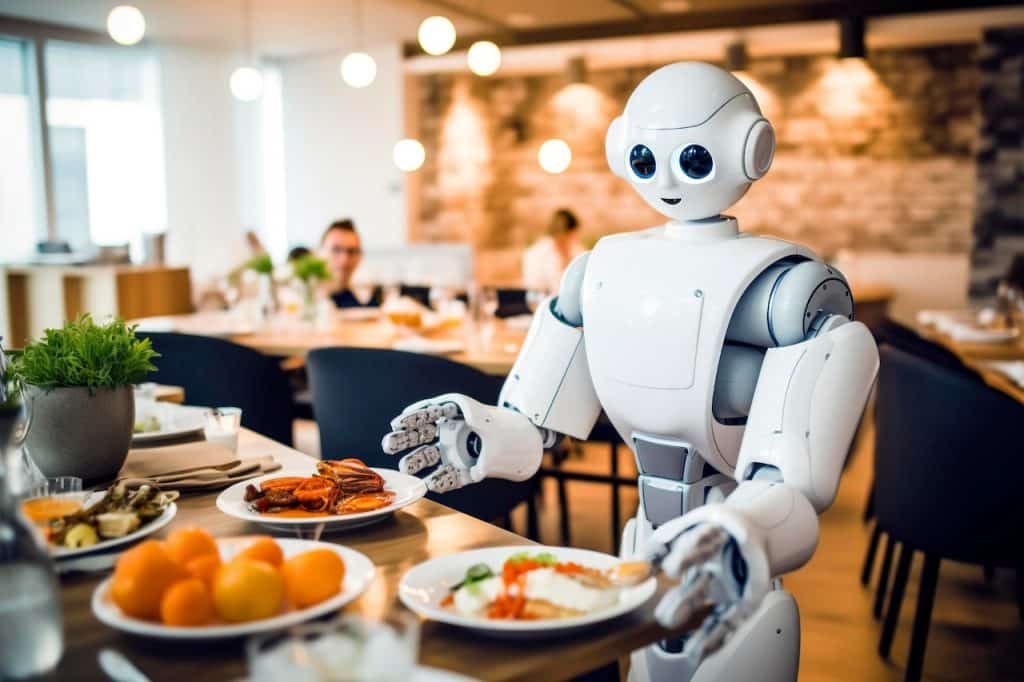Hello!
The next time you call an eatery to book a table, you might want to make sure you're talking to an actual human.
That's because more and more restaurants are turning to AI to handle over-the-phone reservations, Wired reports, in one of the more overlooked areas of the tech being used in hospitality.
 A slew of these services have been launched in just the past few years. Among them, per Wired, include the startups Maitre-D AI, which rolled out in the Bay Area in 2024, RestoHost, which now takes calls at over 150 restaurants in Atlanta, and Slang, which pivoted to offering AI services to restaurants last year when it raised around $20 million in funding.
A slew of these services have been launched in just the past few years. Among them, per Wired, include the startups Maitre-D AI, which rolled out in the Bay Area in 2024, RestoHost, which now takes calls at over 150 restaurants in Atlanta, and Slang, which pivoted to offering AI services to restaurants last year when it raised around $20 million in funding.
It's a pretty low-stakes application of the tech, as far as irresponsible uses of AI go — but it's a testament to just how pervasive AI is becoming in taking over customer service roles once handled by humans across multiple industries.
Bot Backup
The developers of these AI assistants frame it as a way to alleviate overworked restaurant workers, especially in a post-pandemic age when many of these establishments are chronically short-staffed.
 "Restaurants get a high volume of phone calls compared to other businesses, especially if they're popular and take reservations," Alex Sambvani, CEO and co-founder of Slang, told Wired.
"Restaurants get a high volume of phone calls compared to other businesses, especially if they're popular and take reservations," Alex Sambvani, CEO and co-founder of Slang, told Wired.
Sambvani claims that popular restaurants — at least in the big cities his company caters to — get between 800 to 1,000 calls per month — or on the high end of that estimate, over thirty customers, possibly angry or confused, calling in per day. And who wants to deal with that?
"The phones would ring constantly throughout service," Matt Ho, a San Francisco restaurant owner who uses RestoHost, told Wired. "We would receive calls for basic questions that can be found on our website."
"This platform makes the job easier for the host and does not disturb guests while they're enjoying their meal," he added.
Human Touch
That's all well and good. But these AI models tend to be sluggish, and can often get confused by customer inquiries (see: AI-powered drive-thrus).
 In the Wired reporter's experience, "many AI voice agents I called asked me to wait as they were conjuring an answer, or simply remained statically silent before replying." Changing her mind about a reservation mid-conversation, for example, would cause the AI to freeze up.
In the Wired reporter's experience, "many AI voice agents I called asked me to wait as they were conjuring an answer, or simply remained statically silent before replying." Changing her mind about a reservation mid-conversation, for example, would cause the AI to freeze up.
Not all restaurant owners were impressed by the tech's performance, either. Brian Owens, who used Slang after reopening several of his New York restaurants, initially thought the pitch of using an AI to cut down on labor costs made sense.
After he saw how the AI often left customers dissatisfied, however, he was disabused of that belief.
 "If you're asking a robot how the vibe at the restaurant is, versus someone who is able to explain it by not using keywords — you know the difference," Owens told Wired. "I train my host staff to answer the phone with a smile, and you're not getting a smile when you're using AI."
"If you're asking a robot how the vibe at the restaurant is, versus someone who is able to explain it by not using keywords — you know the difference," Owens told Wired. "I train my host staff to answer the phone with a smile, and you're not getting a smile when you're using AI."
He may be onto something. For some customers, any company using AI is a total deal breaker; one recent survey showed that over half would switch to a competitor if they found a business was using AI in a customer service role. Maybe it's best, then, just to have an actual person pick up the phone.
Thank you!
Join us on social media!
See you!






